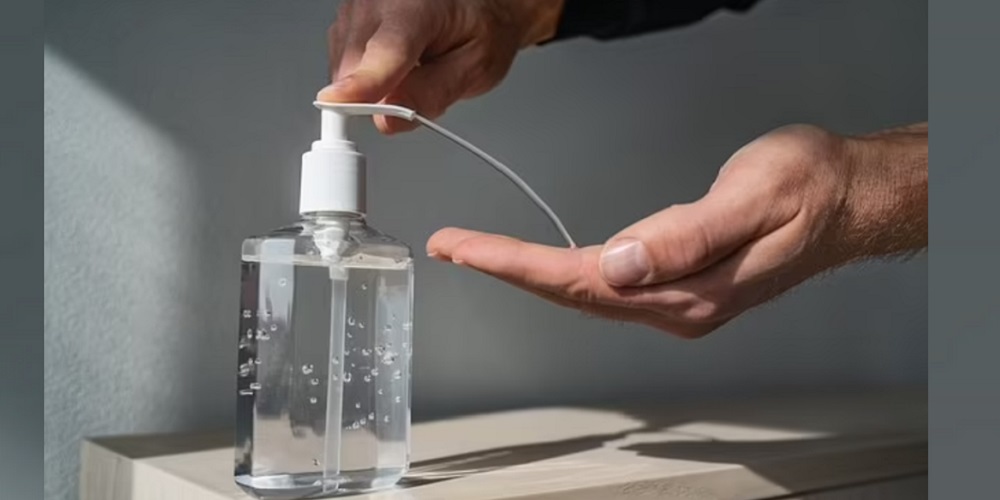News
26-year-old man caught drinking hand sanitizers because he was so addicted to alcohol

A 26-year-old alcoholic was so desperate to get his fix that he stole multiple hand sanitizer bottles so he could get drunk off of the alcohol they contained.
The case, published in the American Journal of Case Reports, reveals the unnamed patient, from France, visited his local emergency room complaining of severe abdominal pain.
Despite receiving pain medications, the patient continued to claim his pain had not subsided and grew agitated.
When doctors could not find anything wrong with him, the man’s roommate informed a nurse that the patient had been taking hand sanitizer bottles, hiding them in his bag and drinking them throughout his stay.
Upon searching, Doctors found several bottles of sanitizer in his bag, of which about 1.5 were consumed.
The man admitted to faking his pain to get access to the sanitizer because he was going through withdrawals due to addiction.
When the patient first arrived in the ER, doctors wrote he was irritated and ‘sometimes verbally aggressive.’
They noted that his abdominal exam and vitals were normal, though he had ‘general poor hygiene’ and a slightly elevated heart rate.
He was given several IV medications, including morphine for pain, though he remained agitated. When the patient continued to complain of pain, additional doctors sent him for a scan of his abdomen, which did not reveal any potential cause for his pain, but rather showed he had a fatty liver, which is often a sign of alcohol use disorder.
His blood tests showed slightly elevated liver enzymes, a sign of liver damage or inflammation.
Sanitizers contain about 80 percent pure alcohol. A can of beer is just five percent.
Doctors who treated the patient warned of an increase in such incidents, as the Covid pandemic made hand sanitizer more widely available, particularly in hospitals.
‘Hand sanitisers are in no doubt essential tools to fight infection, protecting both the user and others,’ the physicians wrote.
‘It is a major challenge to ensure the safety of alcoholic patients inside the ED while maintaining a good hand hygiene policy.’
Doctors gave the patient fluids and infusions of vitamins B1, B3, and B6 to reduce the toxicity from the alcohol and hydrate him. He was admitted to the hospital under observation for 24 hours.
When he was discharged, he was reportedly referred to addiction specialists.
News
Bill to transform YabaTech to University scales second reading in Senate

By Francesca Hangeior
The move to transform YabaTech in Lagos State to a University of Technology and Vocational Studies has got a boost as a Bill to this effect has scaled second reading in the Senate.
After being read the second time yesterday, the Deputy President of the Senate, Senator Barau Jibrin, APC, Kano North, who presided at Tuesday’s plenary session, thereafter referred it to the Committee on Tertiary Education and TETFUND for further legislative action and report back in four weeks.
It is titled, a Bill for an Act to provide for the Establishment of the Yaba Federal University of Technology and Vocational Studies Yaba, Lagos State and to make comprehensive provisions for its due management and administration and for other related matters, 2025 (SB. 738).
In his lead debate on the general principles of the bill, the Senate leader, Senator Opeyemi Bamidele, APC, Ekiti Centra,l said that the Bill essentially seeks to transform and upgrade the YabaTech to Yaba Federal University of Technology and Vocational Studies, Yaba, Lagos State, which has already been done via a presidential fiat.
Bamidele said, “This Bill seeks to establish Yaba Federal University of Technology and Vocational Studies Yaba, Lagos State. The Bill was read the first time in this Hallowed Chamber on Tuesday, 11th March, 2025.
“The Bill essentially seeks to transform and upgrade the YabaTech to Yaba Federal University of Technology and Vocational Studies, Yaba, Lagos State, which has already been done via a presidential fiat.
“Nigeria’s steady march towards education for all in the shortest possible time has taken a giant leap with the introduction of this Bill for an Act to provide for the establishment of this University.
“I am personally excited by the prospect of transforming this Polytechnic to a University of Technology and Vocational Studies as it will motivate both students and academic staff, just as it will upgrade its facilities and enhance its capability to achieve its objectives.
Similarly, The New University will encourage the advancement of learning and hold out to all persons without distinction of race, creed, sex or political conviction the opportunity of acquiring a higher and liberal education. It will also do the following: Provide courses of instruction and other facilities for the pursuit of learning in all its branches, and to make those facilities available on proper terms to such persons as are equipped to benefit from them; Encourage and promote scholarship and conduct research in all fields of learning with emphasis on technical education”
According to the Senate leader, the new school will m”Relate its activities to the social, cultural and economic needs of the people of Nigeria; and Undertake any other activities appropriate for a university of the highest standards.
“If Nigeria, as planned, should aim to become one of the world’s twenty leading economies of the world in this 215t century, we must be ready to adjust and position our educational institutions so that its products are geared towards technological challenges inherent in such projections. Our educational authorities are moving to revamp our institutions for these objectives.
Yaba Federal University of Technology and Vocational Studies, when enacted by the National Assembly will have power to establish such campuses, colleges, faculties, institutes, schools, extra-mural departments and other teaching and research units within the University as may from time to time seem necessary or desirable subject to the approval of the National Universities Commission.
“To ensure continuity in the administration of the university, all property held by or on behalf of the Yaba Polytechnic shall be vested in the University and be held by it for the purposes of the University. Notably, all staff of the Polytechnic are hereby transferred to the University and previous service in the Polytechnic shall count as service for the purposes of any pension payable by the University.
” The institution is prepared to undertake the educational and other modifications that are a natural corollary of transforming to a university. The institution is also prepared to remains true to its core mandate of producing well-trained manpower capable of driving the technological, management and business goals of the nation.
“In this regard, it will seek to emulate the Massachusetts Institute of Technology (MIT) which has built upon a tradition of distinction to become one of the world’s foremost educational institutions.
News
Lawyer faults Amnesty report linking Imo killings to IPOB

By Francesca Hangeior
A human rights lawyer and counsel for the Indigenous People of Biafra, Ifeanyi Ejiofor, has faulted the Amnesty International report on Okigwe killings, describing it as “hasty and full of inconsistencies”, just as he called for a thorough, impartial, and evidence-based investigation.
Recall that some yet-to-be-identified armed men reportedly ambushed and killed some travellers along the Okigwe Road in Imo State, some days ago.
The alleged killings have triggered mixed reactions, with a call for a thorough investigation to unravel the perpetrators.
But in a statement released on Tuesday, Ejiofor said the quick attribution of the killings to IPOB, without exhaustive verification, raises serious concerns about the integrity and neutrality of the Amnesty International report.
According to him, this approach does not align with the expected standards of a globally respected human rights organisation.
He said while he condemned the killing of the innocent travellers by yet-to-be-identified “heartless” perpetrators, he called on Nigerian security agencies to promptly and meticulously investigate the heinous crimes and ensure that those responsible are identified, apprehended, and prosecuted according to the law.
The statement read, “In light of the recent hasty statement issued by Amnesty International (Nigeria) on the Okigwe killings, it is imperative to underscore the need for a thorough, impartial, and evidence-based investigation.
“The quick attribution of the killings to IPOB, without exhaustive verification, raises serious concerns about the integrity and neutrality of the report.
“It must be unequivocally stated that no individual or authority, regardless of their constitutional powers, is permitted to take another’s life outside the due process enshrined in Section 33 of the 1999 Constitution of the Federal Republic of Nigeria (as amended). The sanctity of human life must remain inviolable.
“I call on Nigeria’s security agencies to promptly and meticulously investigate these heinous crimes and ensure that those responsible are identified, apprehended, and prosecuted according to the law.
“The security agencies should stop paying lip service as they often do, and actually conduct a thorough investigation into these dastardly and wanton killings.”
The human rights lawyer said upon a careful review of Amnesty International Nigeria’s statement, several inconsistencies and troubling lapses were observed, such as “questionable sources of casualty figures, premature attribution of blame, potential conflict of interest and ongoing threats in the region”.
“Amnesty International Nigeria reported specific casualty figures without disclosing any independent verification sources.
“This departs from their well-established protocol, which emphasises independent investigations often taking days or weeks before conclusions are drawn.
“While the police acknowledged the attack, they refrained from confirming exact casualty numbers or the real identity of the attackers. Amnesty’s conclusive link to IPOB, therefore, appears speculative and unsubstantiated.
“Concerns have also been raised about the neutrality of the Country Director of Amnesty International Nigeria, who use to hold a political appointment as Special Assistant to the Governor of Yobe State. This dual role casts a shadow over the objectivity of the organisation’s reporting.
“It is a well-known fact that remnants of armed elements loyal to Simon Ekpa continue to destabilise communities across the South-East. While this remains a security concern demanding urgent state intervention, it should not justify rushed attributions of blame without due diligence,” he added.
According to him, national and international stakeholders must demand a credible, unbiased, and fact-driven investigation into the Okigwe killings.
He insisted that the loss of innocent lives must not be politicised or sensationalised, adding that justice must not only be done but must be seen to be done, both to honour the victims and to safeguard the rule of law in our democracy.
“Only the truth, firmly established through rigorous investigation, can pave the path to justice and lasting peace,” he said.
News
Natasha: Court fixes June 27 for judgement on Senate’s suspension

By Francesca Hangeior
The Federal High Court sitting in Abuja, on Tuesday, slated June 27 to deliver judgement on the suit the lawmaker representing Kogi Central, Senator Natasha Akpoti-Uduaghan, filed to quash the six-month suspension that was slammed on her by the Senate.
Justice Binta Nyako okayed the matter for judgement, after all the parties adopted their final briefs of argument.
Cited as defendants in the suit marked: FHC/ABJ/CS/384/2025, are Clerk of the National Assembly, the Senate, the Senate President, Mr. Godswill Akpabio, as well as and the Chairman of Senate Committee on Ethics, Privileges, and Public Petitions, Senator Nedamwen Imasuen.
The embattled lawmaker, through her team of lawyers led by Mr. Jubril Okutekpa, SAN, urged the court to invalidate her suspension which she said was done in disobedience to a valid court order.
However, the defendants challenged the jurisdiction of the court to meddle in what they termed as an internal affair of the Senate.
More so, the defendants accused the plaintiff of breaching an order the court made on April 4, which gagged the parties from making public utterances on the matter pending before it.
The Senate President, Akpabio, through his lawyer, Mr. Kehinde Ogunwumiju, SAN, specifically drew the attention of the court to what he described as “a satirical apology” the plaintiff tendered to him on her Facebook page.
Akpabio insisted that the said apology made mockery of the order of the court.
Meanwhile, before she adjourned the matter for judgement, Justice Nyako said she would first consider the issue of contempt that was raised by the parties before deciding all the preliminary objections.
The trial judge stressed that Natasha’s suit raised “recondite issues of law” that would require judicial interpretation.
It will be recalled that Justice Nyako took over the matter following the recusal of the previous judge, Obiora Egwuatu, who had in a ruling on March 25, returned the case-file after the Senate President accused him of bias.
Justice Egwuatu had on March 4, issued an interim order that stopped the Senate Committee on Ethics, Privileges and Public Petitions from going ahead with the disciplinary proceeding that was initiated against Senator Akpoti-Uduaghan over an allegation that she flouted rules of the legislative house.
He held that the disciplinary process should be placed on hold, pending the determination of the suit that was brought before him by the embattled female lawmaker.
More so, Justice Egwuatu gave defendants in the matter, 72 hours to show cause why it should not issue an order of interlocutory injunction to stop them from probing the plaintiff for alleged misconduct, without affording her the privileges stipulated in the 1999 Constitution, as amended, the Senate Standing Order 2023, and the Legislative Houses (Powers and Privileges) Act.
The interim orders followed an ex-parte application and an affidavit of urgency that was brought before the court by the lawmaker.
However, despite the orders of the court, the Senate Committee held its sitting and suspended the plaintiff for six months.
In a subsequent ruling, Justice Egwuatu amended the interim order he issued in favour of the plaintiff by vacating the aspect that barred the Senate from undertaking any activity within the pendency of the suit.
Not long after the orders were made, the Senate President filed a motion to query the powers of the court to interfere in the affairs of the Senate.
The Kogi state federal lawmaker approached the court after she was summoned to appear before the disciplinary committee following a faceoff she had with the Senate President during plenary on February 20.
While protesting alleged arbitrary change of her seating arrangement, the lawmaker repeatedly raised a point of order to be allowed to speak, even though she had been overruled by the Senate President.
Irked by her conduct, the Senate President referred her case to the Ethics Committee.
In a television interview she granted on February 28, Senator Akpoti-Uduaghan alleged that her troubles in the Senate began after she rejected unwanted advances from the Senate President, Akpabio.
In an ex-parte application she brought before the court, the lawmaker applied for an order to declare any action the Committee would take within the pendency of her suit, as, “null, void, and of no effect.”
Specifically, the court, in the interim orders it made on Tuesday, held: “It is hereby ordered as follows: An order of this Honourbale Court is made granting leave to the Plaintiff/Applicant to serve the 2nd – 4th Defendants/Respondents with the Originating Summons and all other accompanying processes in this Suit by substituted means, to wit: by serving same through the 1st Defendant (Clerk of the National Assembly) or pasting same on the premises of the National Assembly and publishing same in two national dailies.
“An Order of Interim Injuction of this Honourable Court is made restraining the 2nd Defendant/Defendant’s Committee on Ethics, Privileges, and Code of Conduct, headed by the 4th Defendant, from proceeding with the purported investigation against the Plaintiff/Applicant for alleged misconduct, sequel to the events that occurred at the plenary of the 2nd Defendant on the 20th day of February 2025, pursuant to the referral by the 2nd Defendant on the 25th of February 2025, pending the hearing and determination of the Motion on Notice for interlocutory injunction.
As well as, “An order of this Honourable Court is made directing the 1st – 4th Defendants to show cause within 72 hours upon the service of this order on them, why an order of interlocutory injunction should not be granted against them, restraining them from proceeding with the purported investigation against the Plaintiff for alleged misconduct without affording her privileges as stipulated in the Constitution of the Federal Republic of Nigeria 1999 (As Amended), the Senate Standing Order 2023, and the Legislative Houses (Powers and Privileges) Act.”
-

 News5 hours ago
News5 hours agoJust in: Another major headache as 3 PDP senators defect to APC
-

 News24 hours ago
News24 hours agoUK unions slam Govt’s decision to end care worker visas
-

 News14 hours ago
News14 hours agoUS revokes governor’s visa
-

 News14 hours ago
News14 hours ago2nd Anniversary: Tinubu to commission Abuja International Conference Centre – Wike
-

 News7 hours ago
News7 hours agoUnion seals Lagos company over racial discrimination of workers
-

 News22 hours ago
News22 hours agoSAD! Woman, child electrocuted in Edo
-

 Metro14 hours ago
Metro14 hours agoTension in Ondo community as herdsman dies in clash with vigilance group
-

 News13 hours ago
News13 hours agoTaraba Woos Global Investors Ahead of Landmark Economic Summit






